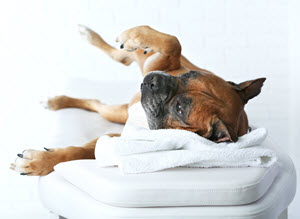What is massage therapy?
 As a form of rehabilitation, massage therapy is the application of specific hand movements on a patient to improve muscle and joint function by relieving tension, spasm, or other restrictions to proper motion. It may be used for warm-up purposes, for relaxing or stimulating muscles in order to prevent injury, or for rehabilitation of a patient after an injury has occurred. Massage is also used to compensate for impaired circulation by augmenting the normal flow of blood and lymphatic fluid. Finally, massage is used to stimulate the function of various internal organs through reflexively linked and externally located portals of access, often termed trigger points and/or acupressure points.
As a form of rehabilitation, massage therapy is the application of specific hand movements on a patient to improve muscle and joint function by relieving tension, spasm, or other restrictions to proper motion. It may be used for warm-up purposes, for relaxing or stimulating muscles in order to prevent injury, or for rehabilitation of a patient after an injury has occurred. Massage is also used to compensate for impaired circulation by augmenting the normal flow of blood and lymphatic fluid. Finally, massage is used to stimulate the function of various internal organs through reflexively linked and externally located portals of access, often termed trigger points and/or acupressure points.
What is the history of massage therapy in veterinary medicine?
While the desire to touch animals is probably one of the first things we are aware of from the time we are newborn, massage therapy itself has been relatively recently adopted as a therapeutic modality by veterinary medicine, and borrows heavily from techniques used in human massage therapy. A few of the more common techniques include trigger-point massage, craniosacral therapy, acupressure, friction massage, and passive range of motion therapy.
On which species of animals is massage therapy practiced regularly?
Sports massage (massage directed at athletes to prevent injury) is used widely to prevent injury in horses before competitions. Passive range of motion (flexing and extending a limb for example) is prescribed as a form of rehabilitation following certain injuries and orthopedic procedures in small animals, especially in dogs. Veterinarians use acupressure on most mammals and even some reptiles.
Who practices veterinary massage therapy and do I need a referral?
Most veterinarians possess the expertise to instruct clients on how to perform passive range of motion techniques to maintain mobility through passive limb movements in convalescing patients. Other massage techniques and applications are much more specialized, and require additional training. Acupressure will often require some formal training in Chinese medical theory. Specific courses in veterinary massage therapy are available to help veterinarians learn trigger point therapy, sports massage and friction massage. Massage on animals can also be performed by a licensed massage therapist after a diagnosis has been reached by a veterinarian, and in accordance with state or provincial veterinary acts. If a non-veterinarian will be performing the treatment, the patient must be referred by a veterinarian, who will then assume responsibility for assessing and coordinating the patient's care.
What conditions are most often treated with massage therapy?
Both acute and chronic musculoskeletal injuries may respond to massage therapy, especially as a complement to other forms of specific treatment. Acupressure can be used as an adjunct therapy for any condition. When used for rehabilitation, the patient's treatment must have been preceded by a veterinary examination and complete diagnosis, including assessment of any other health concerns.
How can my companion animal benefit from massage therapy?
When performed as part of a comprehensive treatment package, massage therapy may minimize injuries and enhance the patient's recovery speed. Animals with decreased mobility from chronic injuries may benefit from massage therapy, with improved range of motion and/or decreased pain. Massage increases circulation and nerve stimulation both where it is applied and also internally in any reflexively associated internal organs.
How successful is massage therapy?
The success of massage therapy, especially as it relates to sports massage, is difficult to measure or validate except when evaluated through controlled clinical trials. Such research is currently lacking in veterinary medicine. The current acceptance of massage therapy as promoting faster recovery from injuries is largely based on clinical experience.
How safe is massage therapy?
When performed by a trained professional, massage therapy is extremely safe. If it is done incorrectly, massage can cause or intensify pain or muscle spasms, resulting in worsening of the original condition or in secondary injuries.
Massage therapy must never be performed on open or infected wounds, on torn muscles, on joints affected with inflammatory arthritis, or if the patient has a fever.
What is the cost of massage therapy?
Comprehensive massage therapy rarely involves a single visit, and costs will vary according to the specific condition being treated and the response of the patient. Before massage therapy is prescribed, a veterinary practitioner must diagnose the condition being treated. The fees associated with massage therapy are set by the individual practitioner, and often reflect the experience, skill, and training of the therapist. Once the veterinary practitioner assesses the response to treatment, the client may be shown how to administer selected massage treatments to the patient between therapy sessions.
Can massage therapy be combined with other types of veterinary medicine?
Massage therapy integrates well into a treatment plan that utilizes either traditional or alternative forms of veterinary medicine. If a non-veterinary massage therapist is used, the veterinarian and massage therapist must communicate to combine their knowledge and skill to develop an appropriate treatment plan. If your companion animal is receiving massage therapy from a practitioner other than your regular veterinarian, it is imperative that both individuals are kept updated about the ongoing treatment in order to provide coordinated care of your pet, to allow proper evaluation of treatment and to minimize any avoidable interactions or interferences.
How can I find out more information about veterinary massage therapy?
Currently, there is little specific information available about veterinary massage therapy, except as it pertains to animal rehabilitation. Your veterinarian should be able to assist you in evaluating the suitability of specific massage therapy for your companion animal.
